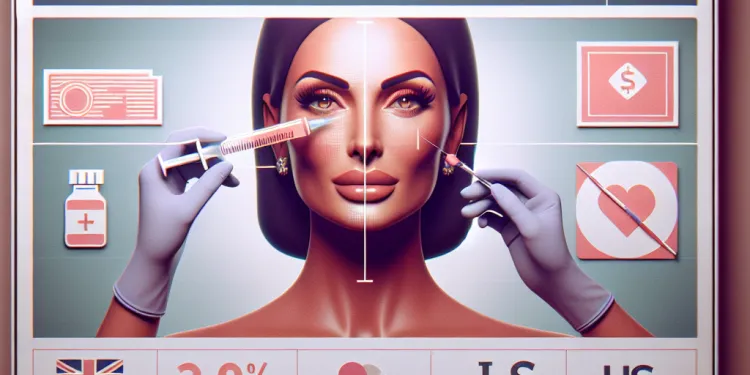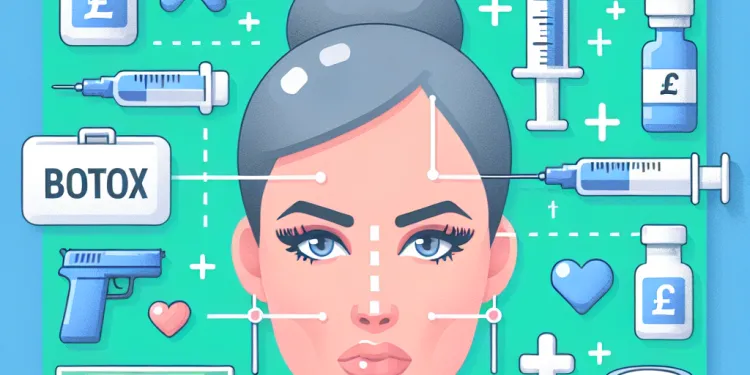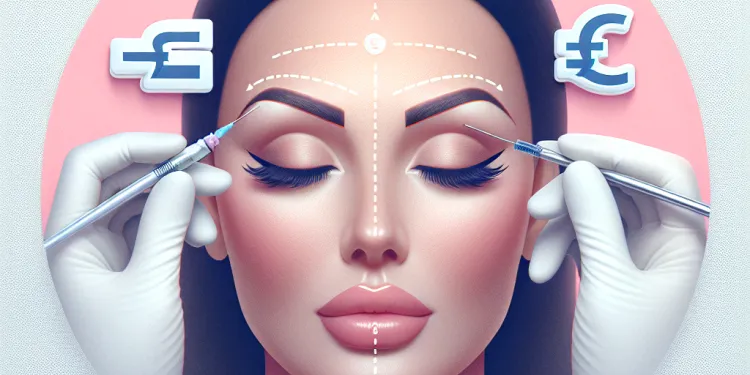
Find Help
More Items From Ergsy search
-

What are the side effects of Botox?
Relevance: 100%
-

What are the side effects of Botox?
Relevance: 99%
-

What should I do if I experience side effects after a Botox injection?
Relevance: 84%
-

Are there any long-term effects of using Botox?
Relevance: 69%
-

Is Botox safe?
Relevance: 66%
-

How long do the effects of Botox last?
Relevance: 66%
-

Is Botox safe?
Relevance: 65%
-

What is Botox?
Relevance: 63%
-

Can Botox be used for migraines?
Relevance: 61%
-

How does Botox work?
Relevance: 60%
-

Can Botox help with excessive sweating?
Relevance: 60%
-

Can Botox cause serious health issues?
Relevance: 60%
-

What is Botox used for?
Relevance: 59%
-

Does Botox hurt?
Relevance: 58%
-

Does Botox injection hurt?
Relevance: 56%
-

What is Botox made from?
Relevance: 55%
-

What are the common uses of Botox?
Relevance: 55%
-

Is Botox vegan?
Relevance: 55%
-

Can Botox lift my eyebrows?
Relevance: 55%
-

How long does Botox last?
Relevance: 54%
-

Can I get Botulism from Botox Treatments?
Relevance: 54%
-

Who can administer Botox?
Relevance: 53%
-

Can anyone get Botox treatments?
Relevance: 53%
-

How should I choose a provider for Botox treatments?
Relevance: 52%
-

What are the side effects of Ozempic?
Relevance: 52%
-

What are the side effects of Paracetamol?
Relevance: 52%
-

How does Botox work if it's related to botulism toxin?
Relevance: 52%
-

Can Botox be used for treating conditions other than wrinkles?
Relevance: 51%
-

What areas can be treated with Botox?
Relevance: 51%
-

Is Botox treatment expensive?
Relevance: 51%
-

What are the side effects of Ibuprofen?
Relevance: 51%
-

Can I get Botox while pregnant?
Relevance: 51%
-

What are the side effects of Aspirin?
Relevance: 50%
-

How often should I get Botox treatments?
Relevance: 50%
-

Are there any common side effects of Mounjaro?
Relevance: 49%
-

What are the common side effects of Abiraterone?
Relevance: 49%
-

How should I prepare for a Botox appointment?
Relevance: 49%
-

What are the common side effects of vaccines?
Relevance: 49%
-

What are the common side effects of Ozempic?
Relevance: 49%
-

What are common side effects of Baxdrostat?
Relevance: 49%
Introduction to Botox
Botox, a popular cosmetic treatment known for its ability to reduce the appearance of fine lines and wrinkles, is derived from the botulinum toxin. Although it is widely used and generally considered safe, it is important to be aware of the potential side effects associated with the procedure. This article provides an overview of these side effects to inform individuals considering Botox treatments in the UK.
Common Side Effects of Botox
The most frequently reported side effects of Botox are mild and tend to resolve quickly. These include redness, swelling, and bruising at the injection site. Immediately after the procedure, patients might experience slight discomfort or a feeling of tightness in the treated area. Headaches are also reported by some individuals following Botox injections, though they typically subside within 24 to 48 hours.
Temporary Muscle Weakness
Botox works by temporarily paralyzing targeted muscles, which can sometimes lead to unintended muscle weakness nearby. For example, when treating facial areas, some patients may find it difficult to control facial expressions fully. This side effect is generally short-lived, fading as the Botox effects wear off. Nonetheless, it is essential for practitioners to administer the injections with precision to minimize risks.
Flu-Like Symptoms
Although less common, some individuals report experiencing flu-like symptoms such as fatigue, mild fever, or a general feeling of unwellness after receiving Botox injections. These symptoms are usually temporary and resolve without the need for medical intervention. Consulting with a healthcare provider is advisable if these symptoms persist or worsen.
Allergic Reactions
Though rare, allergic reactions to Botox can occur. Symptoms of an allergy might include itching, rashes, dizziness, or difficulty breathing. An immediate medical evaluation is crucial if any signs of a severe allergic reaction develop following a Botox treatment. It is always prudent to discuss any known allergies with the practitioner before undergoing Botox injections.
Botox Migration
In some cases, the Botox solution may migrate from the injection site to adjacent tissues, leading to unwanted effects such as drooping eyelids, uneven eyebrows, or a crooked smile. While this is uncommon, selecting a skilled and experienced practitioner can greatly reduce this risk. Proper aftercare, such as avoiding rubbing the area or lying down soon after the procedure, is recommended to prevent migration.
Conclusion
Botox is a popular and generally safe cosmetic treatment when administered by qualified professionals. However, like any procedure, it carries potential side effects. Being informed about these side effects allows individuals to make educated decisions about their cosmetic treatments. In the UK, ensuring that a certified and experienced practitioner administers Botox can help manage and minimize potential risks. Always discuss any concerns and medical history with a healthcare provider before proceeding with the treatment.
Introduction to Botox
Botox is a treatment that helps make fine lines and wrinkles look less visible on the skin. It comes from a substance called botulinum toxin. Many people use Botox, and it is mostly safe. But, it's important to know about the side effects. This guide will explain the side effects of Botox for those thinking about getting this treatment in the UK.
Common Side Effects of Botox
Most side effects of Botox are mild and go away quickly. These can include redness, swelling, and bruising where the needle went in. Right after getting Botox, people might feel a little uncomfortable or notice their skin feeling tight. Some people might get headaches after getting Botox, but these usually go away in 1 to 2 days.
Temporary Muscle Weakness
Botox can make muscles stop working for a short time. This might cause nearby muscles to feel weak. For example, it might be hard to make facial expressions after facial injections. This side effect usually goes away as the Botox wears off. It's important that doctors give the injection correctly to reduce any risks.
Flu-Like Symptoms
A few people might feel flu-like symptoms after getting Botox. These can be feeling tired, having a mild fever, or just not feeling well. These feelings usually go away without seeing a doctor. But, if these symptoms last or get worse, it's a good idea to talk to a healthcare provider.
Allergic Reactions
Allergic reactions to Botox are rare. Signs of an allergic reaction can include itching, rashes, dizziness, or trouble breathing. If someone shows these signs after getting Botox, they should see a doctor right away. Before getting Botox, always talk about any allergies with the doctor.
Botox Migration
Sometimes, the Botox can move to other areas near where it was injected. This can cause effects like drooping eyelids or uneven eyebrows. Although this doesn’t happen often, choosing an experienced doctor can help prevent it. After treatment, avoid rubbing the area or lying down too soon to help stop Botox from moving.
Conclusion
Botox is a popular and usually safe treatment when done by trained professionals. But it can have side effects. Knowing about these side effects helps people make smart choices about their treatments. In the UK, having a certified and skilled doctor apply Botox can help lessen risks. It's important to discuss any worries and health history with a doctor before getting Botox.
Frequently Asked Questions
What are the common side effects of Botox?
Common side effects of Botox include pain, swelling, or bruising at the injection site, headache, fever, and chills.
Can Botox cause allergic reactions?
Yes, though rare, Botox can cause allergic reactions. Symptoms may include itching, rash, hives, wheezing, or difficulty breathing. Seek medical attention if these occur.
Is it normal to have a headache after Botox?
Yes, headaches are one of the common side effects and usually resolve within a few days.
Can Botox affect vision?
Yes, Botox can cause temporary blurred vision, dry eyes, or eyelid drooping.
Are there any long-term side effects of using Botox?
Long-term side effects are rare. However, with repeated use, some people may develop muscle weakness or an immune response to the injections.
How long do side effects from Botox last?
Most side effects are temporary and resolve within a few days to weeks.
Can Botox cause muscle weakness?
Yes, Botox can cause localized muscle weakness in the area of injection.
What is eyelid droop, and can Botox cause it?
Eyelid droop or ptosis is a possible side effect, where the eyelid muscles weaken. It usually resolves within a few weeks.
Is it safe to receive Botox while pregnant or breastfeeding?
The safety of Botox during pregnancy and breastfeeding is not established; therefore, it's typically not recommended.
Can Botox cause difficulty swallowing or speaking?
Botox can cause difficulty swallowing, speaking, or breathing if it spreads beyond the targeted area, but this is uncommon.
Can I experience fatigue after Botox injections?
Fatigue is a possible side effect, although it's not very common.
Are nausea and dizziness possible after Botox injections?
Yes, nausea and dizziness can occur but are relatively uncommon side effects of Botox.
What should I do if I experience severe side effects from Botox?
Seek immediate medical attention if you experience severe side effects, such as difficulty breathing or swallowing.
Can Botox cause hair loss?
Hair loss is not a known side effect of Botox.
Is bruising common after Botox injections?
Yes, bruising at the injection site is fairly common and should resolve in a few days.
Can Botox cause skin rash?
While rare, Botox can cause skin rash as an allergic reaction.
Should I avoid certain activities if I have side effects from Botox?
Avoid rubbing the treated area and any activities that could spread the toxin, such as lying down or vigorous exercise for a few hours post-treatment.
Can Botox injections cause flu-like symptoms?
Yes, flu-like symptoms such as fatigue, mild fever, and muscle aches can occur.
How soon after Botox treatment do side effects appear?
Side effects can appear within a few hours to a few days after treatment.
Can I take medication to alleviate Botox side effects?
Over-the-counter pain relief like acetaminophen can help with discomfort, but consult your doctor before taking any medication.
What can happen after you get Botox?
When you get Botox, some things might happen to your body. These are called side effects. Here are some of them:
- You might feel sore where you got the Botox.
- You might see some small bruises on your skin.
- Your head might hurt.
- You might feel tired.
It's good to talk to a doctor if you feel unwell. A doctor can help if you have worries.
Sometimes people have side effects from Botox.
This can be:
- Pain where the needle goes in
- Swelling or bruises where the needle goes in
- Headache
- Feeling really hot (fever)
- Feeling cold and shivery (chills)
A tool that can help is using a simple symptom diary. You can write when you feel these side effects and show it to your doctor.
Can Botox make you feel itchy or sick?
Yes, it doesn't happen often, but Botox can make some people have an allergy. Signs of an allergy can be itchy skin, a rash, hives, trouble breathing, or making a whistling sound when breathing.
If you notice these problems, tell a doctor right away.
Using simple words can help understand better. Point to each word with your finger as you read. You can also ask someone to read with you.
Is it OK to get a headache after Botox?
Yes, getting headaches is common. They usually go away on their own in a few days.
Tips to feel better:
- Drink lots of water.
- Rest in a quiet, dark room.
- Ask an adult if you can take medicine, like a pain reliever.
Can Botox change how you see?
Yes, Botox can make you have blurry vision for a short time. It can also make your eyes feel dry, or make your eyelids droop.
Does Botox have side effects that last a long time?
Botox is a treatment that makes skin look smooth.
Sometimes, Botox can cause side effects.
Most side effects go away quickly, but some might last longer.
If you are worried, talk to a doctor or nurse.
They can give you more information and help you understand.
You can also use pictures to help explain what you are reading.
Ask someone you trust to read with you and talk about what it means.
Long-term problems are not common. But if you use it a lot, some people might get weak muscles or their body might start to react to the injections.
How long do Botox side effects last?
Botox can have some side effects. These are things like a sore head or feeling weak in the muscles.
Most side effects go away in a few days. But sometimes, they can last a bit longer.
If side effects don't go away, talk to a doctor or nurse. They can help you feel better.
You can try using a calendar to keep track of when side effects start and finish. This can help you know if they are getting better.
Most side effects are not forever. They usually go away after a few days or weeks.
Can Botox make your muscles weak?
Yes, Botox might make the muscles weak where it is injected.
What is eyelid droop, and can Botox cause it?
Eyelid droop is when your eyelid falls down a little. It can make it hard to see.
Botox is a medicine that makes muscles relax. Sometimes, if not done carefully, Botox can make the eyelid droop.
For help, you can:
- Ask a doctor if you have questions.
- Look at pictures of eyelid droop to understand better.
Sometimes, your eyelid might drop down because the muscles get weak. But don't worry, it usually gets better in a few weeks.
Is it okay to get Botox when you are having a baby or feeding a baby?
If you are going to have a baby or are giving milk to a baby, you might want to know if it is safe to get Botox. Botox is a medicine that makes your skin look different.
Here is what you can do to find out more:
- Talk to a doctor. They can tell you what is best for you and your baby.
- Ask lots of questions. It's okay to know what you are putting in your body.
Remember, it's important to be careful so you and your baby stay healthy.
We are not sure if Botox is safe for pregnant women or mothers who are breastfeeding, so doctors usually say it's better not to use it.
Can Botox make it hard to swallow or talk?
Sometimes, Botox can make it hard to swallow, talk, or breathe. This happens if the Botox spreads to other places in the body. But don't worry, this doesn't happen often.
If you find it hard to understand, try using a reading ruler or using your finger to follow the words. This can help you read one line at a time and keep your place.
Will I feel tired after Botox?
Feeling tired is something that can happen, but it doesn't happen to many people.
Can you feel sick or dizzy after getting a Botox injection?
Yes, feeling sick and feeling dizzy can happen with Botox, but these are not very common.
What to do if Botox makes you very sick?
If you have big problems like trouble breathing or swallowing, see a doctor right away.
Can Botox make your hair fall out?
Botox does not make your hair fall out.
Do you often get bruises after Botox injections?
After you get Botox injections, you might see bruises on your skin. This can happen to some people. Here’s what you can do to help:
- Stay calm: It's normal and usually not a big problem.
- Ice pack: Put a cold pack on the area to help it feel better.
- Rest: Give your body some time to heal.
If you are worried, talk to your doctor or nurse. They can help you feel safe and better understand what is happening.
Yes, getting a bruise where you got a shot is normal. It should go away in a few days.
Can Botox cause a skin rash?
Sometimes, Botox can make your skin itchy or red. This is called a rash. Not everyone gets a rash from Botox. If you get a rash, tell your doctor. They can help make it better.
Here are some things you can do:
- Use a cool, wet cloth on the rash to feel better.
- Tell a grown-up if it happens.
- Go see a doctor if it gets worse.
Sometimes, Botox can make your skin red and itchy. This is because some people are allergic to it. But this does not happen often.
What activities should I not do if Botox makes me feel unwell?
If Botox makes you feel sick or strange, you might need to stop doing some things. Here are some ideas:
- Rest: Take it easy and rest. It can help you feel better.
- No Exercise: Don’t do hard exercise if you feel bad. Wait until you feel okay again.
- No Rubbing: Don’t touch or rub the area where you got the Botox. It can make side effects worse.
- Ask a Doctor: If you don’t feel better, talk to a doctor. They can help you know what to do.
Use simple language or picture charts to help understand better.
Don't touch or rub the area where you got the treatment. For a few hours after, also avoid things like lying down or doing hard exercise that can make the medicine spread.
Can Botox Make You Feel Like You Have the Flu?
Yes, you might feel tired, have a low fever, or your muscles might hurt. These are like having the flu.
When do side effects show up after Botox?
Side effects might happen a few hours or a few days after treatment.
Can I take medicine to feel better from Botox side effects?
You can take medicine you buy from a store to help with pain. One kind is called acetaminophen. But talk to your doctor first before you take any medicine.
Useful Links
This website offers general information and is not a substitute for professional advice.
Always seek guidance from qualified professionals.
If you have any medical concerns or need urgent help, contact a healthcare professional or emergency services immediately.
Some of this content was generated with AI assistance. We’ve done our best to keep it accurate, helpful, and human-friendly.
- Ergsy carfully checks the information in the videos we provide here.
- Videos shown by Youtube after a video has completed, have NOT been reviewed by ERGSY.
- To view, click the arrow in centre of video.
- Most of the videos you find here will have subtitles and/or closed captions available.
- You may need to turn these on, and choose your preferred language.
- Go to the video you'd like to watch.
- If closed captions (CC) are available, settings will be visible on the bottom right of the video player.
- To turn on Captions, click settings .
- To turn off Captions, click settings again.
More Items From Ergsy search
-

What are the side effects of Botox?
Relevance: 100%
-

What are the side effects of Botox?
Relevance: 99%
-

What should I do if I experience side effects after a Botox injection?
Relevance: 84%
-

Are there any long-term effects of using Botox?
Relevance: 69%
-

Is Botox safe?
Relevance: 66%
-

How long do the effects of Botox last?
Relevance: 66%
-

Is Botox safe?
Relevance: 65%
-

What is Botox?
Relevance: 63%
-

Can Botox be used for migraines?
Relevance: 61%
-

How does Botox work?
Relevance: 60%
-

Can Botox help with excessive sweating?
Relevance: 60%
-

Can Botox cause serious health issues?
Relevance: 60%
-

What is Botox used for?
Relevance: 59%
-

Does Botox hurt?
Relevance: 58%
-

Does Botox injection hurt?
Relevance: 56%
-

What is Botox made from?
Relevance: 55%
-

What are the common uses of Botox?
Relevance: 55%
-

Is Botox vegan?
Relevance: 55%
-

Can Botox lift my eyebrows?
Relevance: 55%
-

How long does Botox last?
Relevance: 54%
-

Can I get Botulism from Botox Treatments?
Relevance: 54%
-

Who can administer Botox?
Relevance: 53%
-

Can anyone get Botox treatments?
Relevance: 53%
-

How should I choose a provider for Botox treatments?
Relevance: 52%
-

What are the side effects of Ozempic?
Relevance: 52%
-

What are the side effects of Paracetamol?
Relevance: 52%
-

How does Botox work if it's related to botulism toxin?
Relevance: 52%
-

Can Botox be used for treating conditions other than wrinkles?
Relevance: 51%
-

What areas can be treated with Botox?
Relevance: 51%
-

Is Botox treatment expensive?
Relevance: 51%
-

What are the side effects of Ibuprofen?
Relevance: 51%
-

Can I get Botox while pregnant?
Relevance: 51%
-

What are the side effects of Aspirin?
Relevance: 50%
-

How often should I get Botox treatments?
Relevance: 50%
-

Are there any common side effects of Mounjaro?
Relevance: 49%
-

What are the common side effects of Abiraterone?
Relevance: 49%
-

How should I prepare for a Botox appointment?
Relevance: 49%
-

What are the common side effects of vaccines?
Relevance: 49%
-

What are the common side effects of Ozempic?
Relevance: 49%
-

What are common side effects of Baxdrostat?
Relevance: 49%


